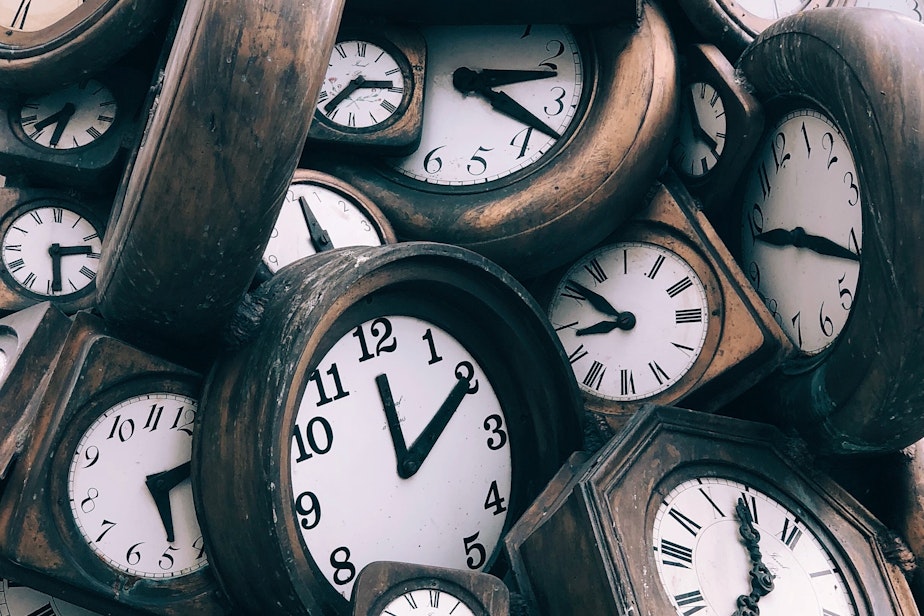Permanent Daylight Saving Time is bad for your health, says UW expert

The U.S. Senate voted unanimously this week to switch the entire country over to permanent Daylight Saving Time. That would mean more light in the evening and darker mornings. Washington and Oregon have been trying to do this for years but needed Congress to act.
The bill is heading to the House. If it does become law, it could take effect in November 2023.
Many people love this idea, but not everyone. Dr. Nate Watson is a professor of neurology at the University of Washington and the co-director of UW Medicine's Sleep Center. He supports ending the twice-per-year clock switch but says permanent Daylight Saving Time would be bad for our health.
This interview has been edited for clarity.
Dr. Nate Watson: The farther west you live in a time zone, the later sunset occurs, so going into permanent Daylight Saving Time is like moving everybody westward in their time zone. We know every extra hour of daylight in the evening reduces sleep duration by 19 minutes. And not only that, but research has shown that the farther west you live in a time zone, the more likely you are to be obese, to have cardiovascular disease or diabetes, and to have higher risk of breast cancer. Your workplace productivity reduces, and wages are 3% lower.
If we think about going to permanent Daylight Saving Time as moving everybody to the western edge of their time zone, I think we can expect some of these negative impacts.
Kim Malcolm: Why would moving to Daylight Saving Time permanently lead to those kinds of health problems?
First off, it misaligns our body clock with the sun clock. When that gets misaligned, our bodies don't function optimally and problems arise. Most people have reasons why they have to wake up in the morning, to go to school or to go to work. Later sunsets result in shorter sleep, and we know shorter sleep is associated with cardiovascular disease, diabetes, poor mental health, and other negative aspects. That's really what's going on here.
Sponsored
What do we know about the health impacts of being on permanent Daylight Standard Time?
We know that permanent Standard Time is the optimal way to align our internal body clocks with the sun clock. We are creatures that are driven by the rising and the setting of the sun. Our circadian rhythms are entrained to that. We’re built that way. In fact, when it gets dark out, that's when our brain secretes melatonin. It begins to tell us that it's time to go to sleep. Going into permanent Standard Time is really the more natural way for our bodies to align with the sun clock. Let's take the natural path to not changing our clocks back and forth. Let's go to permanent Standard Time.
There are people around the Northwest who say it's dark so early in the winter. They love more daylight in the evening. What do you say to those folks?
Daylight Saving Time does not add a single minute of daylight to a 24-hour day. That’s point number one. I think we can all agree we want to stop changing clocks back and forth. But essentially, the discussion is really centered around going to permanent Daylight Saving Time in order to eliminate the clock changes. Nobody is really talking about the fact that we can just go to permanent Standard Time and therein eliminate clock changes as well. In fact, you don't need federal legislation to go to permanent Standard Time. Any state can choose to do that right now.
But those evenings do get dark. That is a long time to live with over the winter months around here.
I think the challenge is going to be waking up. We may be waking up as a society three hours or more before sunrise in order to go to work when we have permanent Daylight Saving Time. That's going to be when it dawns on people that this was a bad idea. In the summertime, more daylight in the evening, most people are in favor of that but there's a cost to be paid. That's what I'm hoping to convey today. Is that cost worth it? Of course, we can recreate more in the afternoon and evening with more daylight at those times, but is the cost of our health and well-being worth it? I would challenge everybody to think that through.
Listen to the interview by clicking the play button above.





